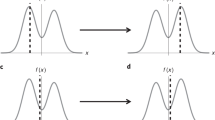Abstract
It is well known that multidimensional spatial voting can involve intransitivity and cycles, resulting in outcomes anywhere in the policy space. These results are typically referred to as the “chaos theorems”. In this paper, I show that the connection between non-equilibrium spatial voting and “chaos” is not merely semantic, but is theoretic. Using symbolic dynamics, I show that if a three-cycle intransitivity among social choices exists, then cycles of all lengths greater than three are possible. This result is then used to establish the three conditions of sensitive dependence on initial conditions, topological transitivity, and dense periodic points, demonstrating the formal connection between multidimensional spatial voting and chaotic nonlinear dynamics.
Similar content being viewed by others
References
Black D (1958) The theory of committees and elections. Cambridge University Press, London
Cohen L (1979) Cyclic sets in multidimensional voting models. J Econ Theory 20: 1–12
Cohen L, Matthews S (1980) Constrained Plott equilibria, directional equilibria and global cycling sets. Rev Econ Studies 47: 975–986
Devaney RL (1989) An introduction to chaotic dynamical systems. Addison-Wesley, Redwood City, CA
Ferejohn JA, McKelvey R, Packel E (1984) Limiting distributions for continuous state Markov voting models. Soc Choice Welfare 1: 45–67
Fiorina MP, Plott CR (1978) Committee decisions under majority rule: an experimental study. Am Polit Sci Rev 72: 575–98
Kramer GH (1977) A dynamical model of political equilibrium. J Econ Theory 16: 310–34
McKelvey RD (1976) Intransitivities in multidimensional voting models and some implications for agenda control. J Econ Theory 12: 472–482
McKelvey RD (1979) General conditions for global intransitivities in formal voting models. Econometrica 47: 1085–112
Plott CR (1967) A notion of equilibrium and its possibility under majority rule. Am Econ Rev 57: 788–806
Saari DG (1989) A dictionary for voting paradoxes. J Econ Theory 48: 443–475
Saari DG (1990) The Borda dictionary. Soc Choice Welfare 7: 279–317
Saari DG (1991) Erratic behavior in economic models. J Econ Behav Organ 16: 3–35
Saari DG (1992) Symmetry extensions of “neutrality” I: advantage of the Condorcet loser. Soc Choice Welfare 9: 307–36
Schofield N (1979) Instability of simple dynamic games. Rev Econ Studies 45: 575–94
Schofield N (1983) Generic instability of majority rule. Rev Econ Studies 50: 696–705
Schofield N (1984) Social equilibrium and cycles on compact sets. J Econ Theory 33: 59–71
Schofield N, Grofman B, Feld SL (1988) The core and the stability of group choice in spatial voting games. Am Polit Sci Rev 82: 195–211
Shepsle KA (1979) Institutional arrangements and equilibrium in multidimensional voting models. Am J Polit Sci 23: 27–60
Author information
Authors and Affiliations
Rights and permissions
About this article
Cite this article
Richards, D. Intransitivities in multidimensional spatial voting: period three implies chaos. Soc Choice Welfare 11, 109–119 (1994). https://doi.org/10.1007/BF00179207
Received:
Accepted:
Issue Date:
DOI: https://doi.org/10.1007/BF00179207




